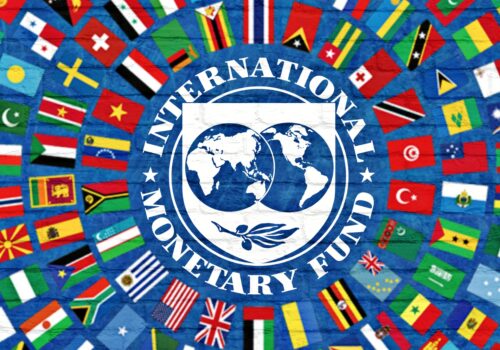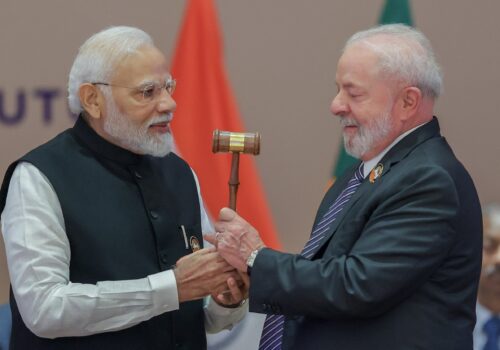Brazil’s approach to the G20: Leading by example
More than four months have passed since Brazil took over the Presidency of the G20 from India. Judging by the outcomes of preparatory meetings leading up to the G20 Summit on November 18-19 in Rio de Janeiro, the headwind of geopolitical rivalry seems to have strengthened. The world is not only divided over the Russian war on Ukraine but also over Israel’s war in Gaza in response to the Hamas attack last October. Against the backdrop of heightened geopolitical tension, these divisions have prevented the ministerial meetings from issuing joint communiques. This has prompted some analysts to call 2024 one of the most unpredictable years of the G20, with an “outside chance it could all collapse into rancor,” according to Andrew Hammond of the London School of Economics. The G20 finance ministers and central bank governors will meet again on April 17-18 during the IMF/World Bank spring meetings in Washington DC.
Despite the headwinds, Brazil’s non-aligned, cooperative, and practical approach holds out the promise of a constructive outcome for this year’s G20 meetings—especially if progress is not being measured by joint communiques (which have become irrelevant) but by agreements on concrete global initiatives. Under the overarching theme “Building a Just World and a Sustainable Planet”, Brazil has worked with countries in the Global South as well as developed countries to build consensus in launching a variety of global initiatives by the time of the G20 Summit. These initiatives reflect the key concerns of the Global South but have built on previous international agreements and include practical proposals for implementation.
Brazil’s proposed initiatives
First is the push to reform the United Nations system and the Bretton Woods institutions like the IMF, World Bank, and World Trade Organization. Reforms to the UN Security Council—where five permanent members (P5) have veto power—have been on the international agenda for a long time. While widely acknowledged in principle, no specific proposal has gained any traction. Brazil has put forward the idea that a P5 member should not be allowed to use its veto power in cases directly relating to itself—somewhat similar to the Western judiciary practice of reclusion of judges in cases of conflicts of interest. This would have meant that Russia would not have been able to use its veto power when the Security Council discussed the war in Ukraine. Such a proposal will not get the backing of the P5, especially amid the current geopolitical rivalry. But it could gather support from many countries, and not only within the Global South—keeping pressure on P5 members to respond with counter-proposals.
Calls for reform of the IMF and World Bank have been widely shared by the Global South, reiterated most recently by China demanding a redistribution of quota and voting shares to “better reflect the weight a country carries.” The G24, representing developing countries at the IMF and World Bank, has circulated a paper proposing specific reforms. These and other ideas about quota reform are scheduled be discussed by the IMF in the year ahead.
Second, another of Brazil’s linchpins for this year is launching a Global Alliance Against Hunger and Poverty as a tool for reaching the UN Sustainable Development Goals by 2030. That initiative leverages Brazil’s position as the second biggest food-exporting country. Specifically, the alliance will not be about initiating new funds or programs but finding ways to coordinate numerous existing funds and programs to make them more useful to recipient countries and easier to solicit contributions from developed countries. It also will compile a basket of best practices in anti-hunger and anti-poverty policies to help other countries develop their own programs. In this context, Brazil will showcase its acclaimed Bolsa Familia family welfare program, which has helped significantly reduce the country’s poverty rate and has been adapted in almost twenty other nations.
Third, Brazil will launch a Task Force for the Global Mobilization Against Climate Change to spur the G20 to help create a conducive political environment for a new and robust goal on climate finance to be agreed at this year’s COP 29 in Azerbaijan as well as for countries to present their renewed and more ambitious Nationally Determined Commitments (NDCs) to reach net zero emissions at the 2025 COP30 under Brazil’s chairmanship. Brazil will also advance its proposed Global Bioeconomy Initiative to bring together science, technology, and innovation on the use of biodiversity to promote sustainable development. This initiative will also try to expand developing countries’ access to various fragmented climate funds including the Green Climate Fund, the Climate Investment Fund, the Adaptation Fund, and the Global Environment Facility.
Fourth, leveraging the momentum of the global corporate minimum tax (effective at the beginning of this year), Brazil wants to propose a global initiative to impose a minimum tax on the super-rich which France has endorsed. This will help Brazil rally support from Global South countries as well as others to advance the proposal.
Last but not least, in September 2023 Brazil and the United States signed an MOU for a Partnership for Workers’ Rights (in particular in the gig economy). They pledged to pass necessary national legislation to achieve that goal and hope to use it as an example to get other countries to join.
The themes across these initiatives are practicality, leading by example, and a willingness to bypass time-consuming, top-down international negotiations.
While Brazil’s proposals will not all be adopted at the G20 Summit, especially in their original versions, most probably will be with some modifications. This outcome, with or without a joint communique, would represent a serious contribution by a key member of the Global South to the global reform agenda. And it comes after the achievements of India in its Presidency of last year’s G20. If South Africa keeps up this track record when assuming the G20 Presidency in 2025 (when Brazil will chair the BRICS-10 and COP30), an important step forward will be made in establishing the leadership roles of the major countries in the Global South. They are showing the ability to rally their members and to reach out to developed countries to shape global reform efforts. And if those countries, working with their partners, can sustain the implementation of the initiatives they sponsored, that would begin to make meaningful changes in the current international political and economic system. The main risk, of course, is that geopolitical rivalry will derail cooperative efforts to address pressing global problems. It remains to be seen to what extent that will happen.
Hung Tran is a nonresident senior fellow at the Atlantic Council’s Geoeconomics Center, a former executive managing director at the Institute of International Finance and former deputy director at the International Monetary Fund.

At the intersection of economics, finance, and foreign policy, the GeoEconomics Center is a translation hub with the goal of helping shape a better global economic future.
Further reading
Thu, Mar 28, 2024
Understanding the debate over IMF quota reform
Econographics By Hung Tran
The politics and mathematics of reform are tougher than they appear. A simple reform matching quotas to global economic weight will not be welcomed by many countries.
Wed, Feb 14, 2024
Brazil aims to advance its bid for leadership of the Global South through food security
Econographics By Josh Lipsky, Mrugank Bhusari
If Brazil delivers tangible benefits on food security through its Presidency of the G20 and COP30, it will cement its position as a key leader of the Global South.
Wed, Feb 21, 2024
What’s on Brazil’s G20 agenda? Start by looking at where India left off.
New Atlanticist By
As G20 foreign ministers kick off their meeting in Rio de Janeiro, expect to see the shared views of New Delhi and Brasília reflected in continuity between their G20 agendas.
Image: The 2024 G20 Rio de Janeiro summit, Brasil logo seen on billboard, Jakarta, Indonesia, December 21, 2023/Shutterstock.


